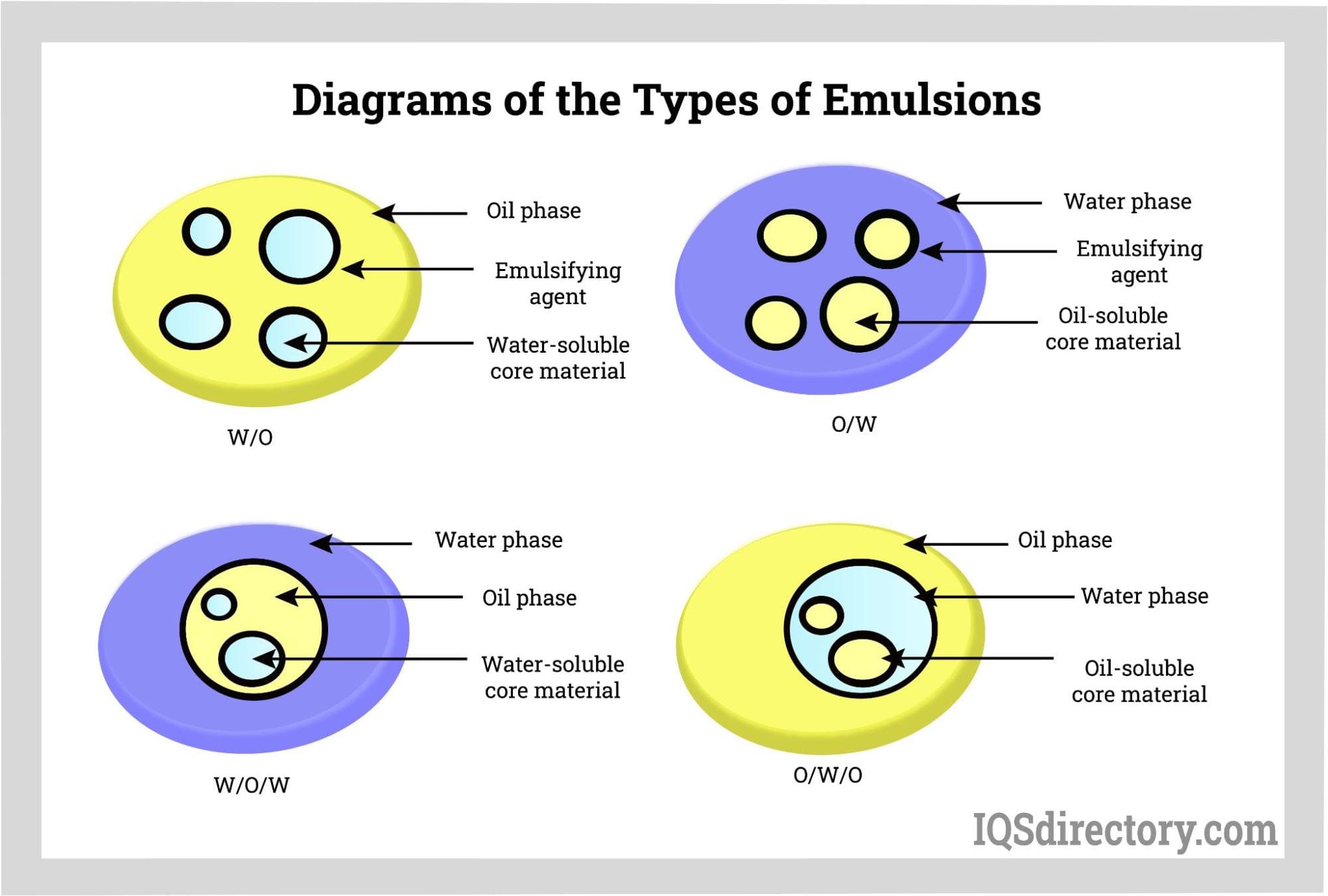Understanding Emulsifiers in Pharmaceutical Applications
Discovering Various Types of Emulsifiers and Their Applications Across Industries
Emulsifiers play a crucial duty in various sectors, ensuring items keep their wanted appearance and stability. You may be stunned to find the distinctions between natural and synthetic emulsifiers, each bringing unique benefits to the table. Whether it remains in your favored salad clothing or a skincare product, these compounds are almost everywhere. Comprehending their applications can disclose much about item top quality and efficiency, yet that's just the beginning of the story.
What Are Emulsifiers?
Emulsifiers are essential materials that assist mix 2 immiscible fluids, like oil and water, developing a stable mix. You frequently experience emulsifiers in everyday products, from salad dressings to lotions.
In food production, emulsifiers boost the mouthfeel and security of products, making them more delightful. You might not understand it, but they also play a significant function in boosting service life, preventing splitting up, and preserving look. In cosmetics, emulsifiers assist develop lavish textures, enabling also application and absorption. On the whole, recognizing emulsifiers can aid you value the scientific research behind the items you utilize daily, showcasing their importance in numerous sectors.
Kinds of Emulsifiers: All-natural vs. Synthetic
When thinking about emulsifiers, it is very important to acknowledge the difference in between all-natural and artificial options. Natural emulsifiers, originated from plant or pet resources, often attract those looking for much healthier, extra environmentally friendly products. Examples include lecithin from soybeans and beeswax, which can supply security in food and cosmetic formulations.

Selecting between all-natural and artificial emulsifiers boils down to your certain demands. If you prioritize clean tags and sustainability, all-natural options may be your finest wager. However, if performance and uniformity are your objectives, you might lean towards synthetic emulsifiers. Ultimately, comprehending your needs will help you choose the ideal emulsifier for your project.

Mechanisms of Activity: Just How Emulsifiers Work
Understanding the differences between natural and synthetic emulsifiers sets the stage for checking out exactly how these compounds feature. Emulsifiers function by reducing the surface tension in between 2 immiscible fluids, like oil and water.
As you mix, the emulsifiers create an obstacle around oil beads, stopping them from integrating. This causes a steady solution, preserving consistency in products. The effectiveness of an emulsifier frequently depends upon its concentration, molecular structure, and the characteristics of the liquids entailed. By recognizing these devices, you can much better value the important function emulsifiers play in different applications, from cosmetics to pharmaceuticals, guaranteeing the desired texture and security in items you utilize each day.
Emulsifiers in the Food Market
In the food industry, around 80% of refined foods consist of emulsifiers, highlighting their necessary function in enhancing appearance and stability. These ingredients aid blend oil and water, developing smooth, consistent products like salad dressings, sauces, and gelato. When you select up a jar of mayo or a bottle of delicious chocolate syrup, you're experiencing the magic of emulsifiers at work.
Common emulsifiers like lecithin, mono- and diglycerides, and polysorbates aren't nearly preference-- they enhance rack life and protect against component splitting up. This indicates your favorite foods remain fresher and maintain their enticing look.
You'll additionally discover emulsifiers in baked items, where they contribute to moisture retention and crumb framework. By understanding the influence of emulsifiers, you can appreciate exactly how they elevate your food experiences, making each bite not just scrumptious however additionally constant. So, following time you delight in a luscious dip or a rich dessert, keep in mind the hidden heroes at job!
Emulsifiers in Cosmetics and Personal Care Products
While you could think about emulsifiers mostly in food, they play a vital duty in cosmetics and personal treatment products as well. These materials help mix water and oil, producing smooth, secure formulations in lotions, creams, and products. You'll find emulsifiers in moisturizers, where they ensure even distribution of moistening ingredients, making them much more efficient on your skin.
When you use make-up, emulsifiers aid attain the right texture, enabling products to move on effortlessly. They likewise improve the service life of items by protecting against splitting Source up, ensuring you obtain one of the most out of your favored things.
Usual emulsifiers in this industry consist of glyceryl stearate and cetyl alcohol, which not just maintain solutions but additionally provide skin benefits. Next time you reach for a cream or structure, bear in mind that emulsifiers are quietly working behind the scenes to keep your items reliable and delightful to utilize.
Emulsifiers in Pharmaceuticals
Emulsifiers play a necessary function in pharmaceuticals by making sure that active ingredients are equally dispersed within liquid formulations. When you're developing dental, topical, or injectable medicines, you need emulsifiers to maintain blends of oil and water, improving the bioavailability of the active compounds. This stability is important for maintaining the performance and safety and security of the product throughout its life span.
You could come across a number of kinds of emulsifiers, like all-natural Recommended Site ones originated from plant resources or synthetic options especially created for targeted applications. Each type can affect the texture, find out here absorption price, and general efficiency of the medicine.
On top of that, emulsifiers can enhance the solubility of badly water-soluble medicines, making them a lot more therapeutic. Therefore, you can create solutions that are much easier to administer and much more effective for individuals - Emulsifiers. Understanding the function of emulsifiers will certainly assist you make educated options in pharmaceutical growth
Emulsifiers in Industrial Applications and Paints
When you consider commercial applications and paints, emulsifiers come to be important for accomplishing the wanted consistency and performance of products. They assist support combinations of water and oils, avoiding separation and making sure harmony. In paint solutions, emulsifiers enhance dispersion, enabling pigments to blend effortlessly and giving a smooth coating.
You'll discover that various kinds of emulsifiers provide to specific needs, such as enhancing bond, minimizing surface area stress, or boosting longevity. In coverings, they help manage viscosity, making application simpler and a lot more effective.
Beyond paints, emulsifiers play a substantial role in adhesives and sealants, adding to far better bonding and adaptability. Emulsifiers. By picking the appropriate emulsifier, you can substantially boost item top quality and efficiency, making your offerings much more competitive on the market. To summarize, emulsifiers are vital for enhancing industrial applications, ensuring that products satisfy the needs of consumers and industry criteria alike
Often Asked Questions
Are Emulsifiers Safe for Consumption in Food Products?
Yes, emulsifiers in food items are normally risk-free for consumption. They're examined for safety and security and authorized by regulatory firms. You can take pleasure in foods containing emulsifiers without stressing, as they improve texture and security in your meals.
Can Emulsifiers Cause Allergies in Some People?
Yes, emulsifiers can trigger allergies in some individuals. If you're delicate to specific ingredients, it's vital to review labels thoroughly and get in touch with a healthcare specialist if you experience any adverse responses. Stay educated and safe!
Just How Do Emulsifiers Impact the Life Span of Products?
Emulsifiers improve the life span of products by maintaining mixes, protecting against separation. They aid maintain structure and flavor, guaranteeing your items stay appealing and fresh for longer, inevitably decreasing waste and enhancing your total experience.
Are There Vegan-Friendly Emulsifiers Available?
Yes, there are lots of vegan-friendly emulsifiers offered. You'll locate options like soy lecithin, sunflower lecithin, and guar periodontal, which function well in various recipes while maintaining your recipes plant-based and delicious.

What Are the Ecological Influences of Synthetic Emulsifiers?
Synthetic emulsifiers can hurt environments via pollution and bioaccumulation. They may interrupt water life and add to dirt destruction. You should consider natural options to lessen these ecological influences while keeping item performance.